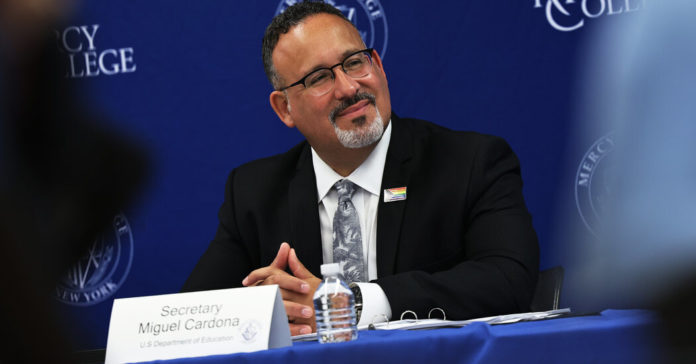
WASHINGTON — A year after the Supreme Court ruled that protections in the Civil Rights Act against discrimination in the workplace extended to gay and transgender people, the Education Department plans to say on Wednesday that it has interpreted the ruling to mean that those protections also extend to students.
The department will say that discrimination against gay and transgender students is prohibited under Title IX, a 1972 law that prohibits sex-based discrimination in federally funded schools. The law has become a political cudgel in the culture wars over sex and education.
“We just want to double down on our expectations,” Miguel A. Cardona, the education secretary, said in an interview. “Students cannot be discriminated against because of their sexual orientation or their gender identity.”
The Education Department’s interpretation of Title IX is the opposite of the stance taken by the Trump administration, which maintained that transgender students were not entitled to protections and threatened last year to withhold federal aid from schools that allowed transgender athletes to participate in scholastic sports. During the last weeks of the Trump administration, the Education Department issued guidance saying that the Supreme Court ruling did not offer transgender students protections.
Since Inauguration Day, the Biden administration has conducted a sweeping effort to rescind, revise or revoke a number of Trump-era policies that rolled back transgender rights. The Department of Housing and Urban Affairs, the Justice Department and the Department of Health and Human Services have all issued guidance affirming the rights of transgender Americans.
But the Education Department’s announcement does not change the process of reporting or investigating individual cases of discrimination, Mr. Cardona said. And it is unclear how far the new interpretation of the ruling will go to address legislative efforts to restrict rights based on gender identity. That includes dozens of bills introduced by Republicans across the country to bar transgender girls from playing sports.
“The reality is each case has to be investigated individually,” Mr. Cardona said. Schools, he added, should “not wait for complaints to come to address these issues.”
He likened the announcement to setting down a marker for schools nationwide, alerting them that the Biden Education Department would not tolerate discrimination in schools receiving federal funds.
“This is really clarity around how we interpret it,” Mr. Cardona said. “We need to make sure we are supporting all students in our schools.”
Experts are skeptical that the new interpretation of Title IX will compel local officials to make changes, including in states that bar transgender athletes, if they are in compliance with state law.
“Some schools, especially in the states where there is legislation, will simply ignore what the federal government says,” said R. Shep Melnick, a politics professor at Boston College and the author of “The Transformation of Title IX: Regulating Gender Equality in Education.” “And then it becomes a question of whether the federal government wants to take enforcement action, which I think they may be somewhat reluctant to do.”
But President Biden — whose wife, Jill Biden, is a teacher — has shown particular willingness to engage in Title IX changes. In March, he waded into an area that has been important to him but politically charged for more than a decade when he directed Mr. Cardona to conduct an expansive review of all policies related to the law.
That decision came as states introduced their own legislation to bar transgender female athletes from competing on sports teams that did not match their biological sex at birth. The Trump administration had revoked Obama-era guidance on the rights of transgender students, but it had not issued a regulation.
The Education Department announced in April that the public’s input would be included in the effort to review the policies. At the time, officials invited students, educators and other stakeholders to share insights on “the issue of sexual harassment in school environments, including sexual violence, and discrimination based on sexual orientation and gender identity.”
Students and faculty members were also given questionnaires meant to provide a fuller picture of how the Trump-era rules had affected schools’ handling of sexual harassment.
“We are in the process now of synthesizing that information as we go to the next steps of actually developing our rules,” Mr. Cardona said on Tuesday. He did not provide a timeline for when the work would be finished, but he added: “We are going to move as quickly as possible on it. We know many folks are waiting.”








